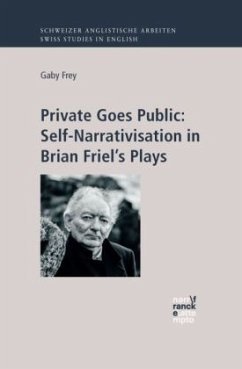In Brian Friel's writing, the distinction between public and private is closely linked to the concepts of home, family, identity and truth. This study examines the characters' excessive introspection and their deep-seated need to disclose their most intimate knowledge and private truths to define who they are and, thus, to oppose dominant discourse or avoid heteronomy.
This study begins by investigating how a number of Anglo-Irish writers including Samuel Beckett, Seamus Deane, Maria Edgeworth, James Joyce, Frank McCourt, John Millington Synge and William Butler Yeats, publicised their characters' private versions of truth thereby illustrating what they perceived to be the space of 'Irishness'. The book then focuses on Friel's techniques of sharing his character's private views to demonstrate how he adopted and adapted these practices in his own oeuvre. As the characters' superficial inarticulateness and their vivid inner selves are repeatedly juxtaposed in Friel's texts, his oeuvre, quintessentially, displays a great unease with the concepts of communication and absolute truth.
This study begins by investigating how a number of Anglo-Irish writers including Samuel Beckett, Seamus Deane, Maria Edgeworth, James Joyce, Frank McCourt, John Millington Synge and William Butler Yeats, publicised their characters' private versions of truth thereby illustrating what they perceived to be the space of 'Irishness'. The book then focuses on Friel's techniques of sharing his character's private views to demonstrate how he adopted and adapted these practices in his own oeuvre. As the characters' superficial inarticulateness and their vivid inner selves are repeatedly juxtaposed in Friel's texts, his oeuvre, quintessentially, displays a great unease with the concepts of communication and absolute truth.

